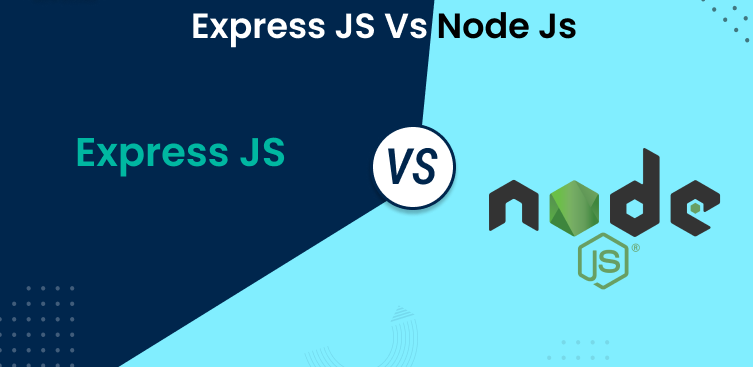Node.js vs. Express.js: Comparing Backend Technologies for Web Development
When it comes to backend development with JavaScript, two popular options that often come up are Node.js and Express.js. While Node.js is a runtime environment that allows JavaScript to run on the server-side, Express.js is a web application framework built on top of Node.js. In this blog post, we will dive into a detailed comparison of Node.js and Express.js, helping you determine the best backend technology for your next project.
Node.js: Power and Versatility
Node.js has gained immense popularity due to its power and versatility. It is built on the V8 JavaScript engine, which provides excellent performance and scalability. With Node.js, developers can build scalable, high-performance backend applications, making it ideal for handling heavy server loads. It also has a vast ecosystem of modules and packages available through npm (Node Package Manager), offering a wide range of tools and libraries to enhance development productivity.
Express.js: Simplicity and Flexibility
Express.js, a lightweight and unopinionated web application framework, is built on top of Node.js. It simplifies backend development by providing a minimalist approach and giving developers the freedom to structure their applications as needed. Express.js offers features such as routing, middleware support, and template engines, making it easier to build web applications quickly. Its simplicity and flexibility make it a popular choice for rapid prototyping and small to medium-sized projects.
Routing and Middleware
One of the key strengths of Express.js is its robust routing system. It provides an intuitive way to define routes and handle HTTP requests. With Express.js, you can easily create RESTful APIs or implement custom routes to handle specific functionalities. Middleware support is another advantage of Express.js, allowing you to execute code before and after request handling. This feature enables tasks such as authentication, logging, error handling, and more, enhancing the functionality and modularity of your application.
Performance and Scalability
Both Node.js and Express.js offer excellent performance and scalability. Node.js utilizes an event-driven, non-blocking I/O model that enables efficient handling of concurrent requests, making it highly scalable. Express.js builds upon Node.js’s performance advantages and adds a lightweight structure, resulting in fast and responsive web applications. However, it’s important to note that performance also depends on how efficiently the code is written and optimized.
Ecosystem and Community Support
Both Node.js and Express.js benefit from vibrant ecosystems and active communities. Node.js has a vast collection of packages and modules available through npm, providing solutions for various development needs. Express.js, being built on top of Node.js, can leverage this rich ecosystem. Additionally, both technologies have extensive documentation, online resources, and communities that offer support, guidance, and updates. This active support system ensures that developers have access to valuable resources throughout their projects.
Project Complexity and Development Speed
The choice between Node.js and Express.js depends on the complexity and requirements of your project. If you are working on a simple or lightweight application, or if you prioritize rapid development, Express.js’s simplicity and ease of use can be advantageous. On the other hand, for more complex projects that require extensive functionality and control, Node.js provides the flexibility and power to meet those requirements effectively.
Community and Adoption
Both Node.js and Express.js have large and active communities. Node.js has been widely adopted by developers and has a strong presence in the industry. Its popularity ensures a wealth of resources, tutorials, and community support. Express.js, being built on top of Node.js, also benefits from this active community and has a significant adoption rate. The thriving communities of both technologies contribute to their stability, continuous improvement, and the availability of third-party libraries and frameworks.
Learning Curve and Developer Skill Set
When considering Node.js and Express.js, it’s essential to evaluate the learning curve and the skill set required for development. Node.js, being a runtime environment, requires developers to have a solid understanding of JavaScript and asynchronous programming concepts. Express.js, on the other hand, provides a more straightforward and streamlined development experience, making it accessible to developers with varying levels of expertise. If you have a team with existing JavaScript skills, transitioning to Node.js and Express.js can be relatively smooth.
Integration with Other Technologies
Another important aspect to consider is how well Node.js and Express.js integrate with other technologies and frameworks. Node.js has strong compatibility with various databases, messaging systems, and frontend frameworks, making it versatile for building full-stack applications. Express.js, with its minimalistic approach, can easily integrate with different middleware, template engines, and frontend libraries, allowing you to choose the best tools for your specific project requirements. The ability to seamlessly integrate with other technologies is crucial for building a robust and efficient application stack.
Industry Adoption and Job Market
Considering the industry adoption and job market can also influence your decision. Node.js and Express.js are widely used in many industries, ranging from startups to large enterprises. Having experience and proficiency in these technologies can open up a plethora of job opportunities. Node.js and Express.js skills are in high demand, making them valuable assets for developers seeking employment or career advancement.
Choosing between Node.js and Express.js for your backend development depends on various factors, including project requirements, scalability needs, development speed, community support, ecosystem compatibility, learning curve, and integration capabilities. Node.js offers power, versatility, and scalability, while Express.js provides simplicity, flexibility, and rapid prototyping capabilities. Consider the unique aspects of your project and the expertise of your development team to make an informed decision. Both technologies have proven their worth in the industry and can help you build efficient and successful backend applications.

